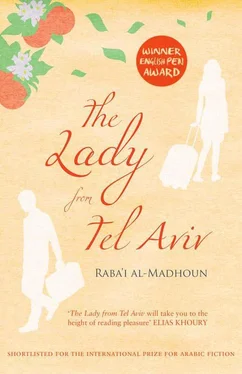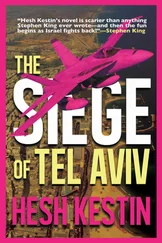I stick my arm out of the window and let the breeze catch and tug it up and down. When we get to the top of Tel al-Zuhur hill, I fling the statuette as far as I can. I imagine Nefertiti sliding and tumbling down the hill, all the way to Firas market at the very bottom.
‘Why didn’t you tell Abu Saber who you were?’ asks Abu Hatem. ‘You broke his heart — and mine too.’
‘I couldn’t do it. It would have been worse had he known it was me. If he knew I saw him like that.’
Abu Hatem turns to look at me. ‘There’s only one other friend left, Walid.’ He speaks the words as if saying them were a relief. ‘Muhammad al-Misriyya. Before you ask, I’m going to tell you everything up front. I haven’t seen him or heard anything about him for twenty years. The world has gone to hell and nobody is who they used to be. Everybody I know lost their head a long time ago — and everybody’s still looking for where they put it.’
The car drives us out of Gaza and down the road back to Jabalia.
Abu Hatem, his wife Amina and their two sons Nasser and Salim are the last people to say goodbye. When they walk out of the apartment, they gather up their sadness and tears and carry it away with them. I remain there for long minutes, my eyes following them as they descend the stairs, watching their hands creep down the banister floor by floor. I listen to the sound of their footsteps growing more and more distant, then those too fade away. At last, the closing of the front door announces that the moment of goodbyes has come to an end. And, as the latch clicks shut, a moment of my life also closes. When that door opens again in the morning, it will be to announce my departure, and the beginning of what is to come.
Now, there are only a few of us left in the apartment — besides my mother and me, there is Amal, Emad, Nasreen, their daughter, and Nasr, their younger son. Shafiq is also there, the last bachelor, who tonight announces that he has decided to get divorced from bachelorhood as soon as he can. My mother almost lets out a piercing ululation, but covers her mouth before anything comes out. The death of his brother Falah is still recent, and the rules of mourning still cast their shadow over any wedding celebration.
I wish Shafiq a happy marriage and tell him that his apartment will not relish the prospect of being renamed. He proposes a new nickname — the new groom’s pad — and adds: ‘It might help spawn a birth and then I might become an Abu So-and-So!’
Throughout the days I have spent in Jabalia, Amal has been tireless in preparing our meals and taking care of everything. She is like our second, younger mother. She sits opposite me now, watching me intensely, as if she sees right through me. The whole time, she is collecting moving, living images of me to keep in her mind’s album. Emad sits there without speaking, looking back and forth at my mother and me. My mother’s tongue has finally stopped moving, and not because of any device. Now it is she who needs someone who will comfort her on the eve of her son’s departure.
I look at Nasreen — she usually gabs as much as a talk-show guest and if anyone ever needed a remote device under her tongue, it is she. But tonight, I am astonished that she too has nothing to say.
It is almost 10 pm. Each of us has settled into silence. Each of us thinks about what to say, then decides there is nothing more to be said. I am worried, thinking about Abu Hatem. By now, they have covered most of the distance on their way home to Khan Yunis. I am bothered by the fact that on their way they have to pass through the Israeli checkpoint at Mahfouza, which cuts the Strip right in half. As if I was not already worried enough about what I will encounter tomorrow.
This is my last night in the Gaza Strip. My trip has lasted twenty-one days. I have gathered impressions and stories like shadows for an album of ghost images. I have let Adel El-Bashity go wherever he wants with Leila Dahman, after supplying him with enough family to keep him safe and enough detail to make it all plausible.
I will let the other characters in my novel fend for themselves. I will let each of them rebel against me as they like. I will let each of them create their own plot for the coming days, and I will not interfere at all as narrator. From now on, the characters will be in charge of their own plausibility.
Somewhere, nearby, there is a huge explosion that shakes the floor we are sitting on. Then we hear helicopters, chopping by at a distance, and short blasts of gunfire. I jump up and stand at the window to see what is happening.
‘Get down!’ My mother screams until I am sitting by her side again. ‘I don’t want you to get hit. Tomorrow you’re going back to your family, and we want you to get there safely.’
I sit squatting on the floor, feeling upset and despondent. I have grown used to sitting this way, but my buttocks are looking forward to touching a real chair again. Any chair — even a cushionless plastic one like those we sat on at Abu Hatem’s on the day of the feast. My mother is worried about stray bullets. No wonder. After twenty days here, I have learned to cultivate a healthy fear of stray bullets, and the cheap, unannounced death they bring. Said Dahman was killed by a stray bullet. Leila Dahman’s first husband died the same way, as did the husband of the other Leila Dahman. It is as if Gazans live in a permanent condition of randomness. Death wanders about as a stray, and each time it chooses its victim, it does so at random. There is the kind of death that is predictable and planned, and those who want that kind of end know how to find it. There is the unpredictable kind of death that happens according to the shifting balance of power between the various militias. There is also natural death, its victims necessarily in the dark about when it will arrive. And then there is the gratuitous, absurd kind of death whose hand falls according to no plan or pattern. One and a half million Palestinians crowded together, living in the most unpredictable way this unpredictable form of life, living for a death that comes and goes. I now understand why, when you are here, it’s impossible to catch a glimpse of the world outside. Now I understand why no one talks about ‘happiness’ or ‘the future’. Only the last bachelor does, as he plans a wedding in this mass graveyard, in the hopes that he might father many children who will join him in waiting for a future that is always only murky.
Another explosion crashes outside, and Abdelfettah rushes in, clutching a transistor radio that broadcasts non-stop chatter. He tells us he has been listening to Sawt al-Hurriyya station. We gather around him and listen, heads down, trembling.
In addition, two Qassam rockets … Our correspondent in Gaza now joins us to give us more details about the incident …
Al-Salaamu ‘aleikum, brother Ayman, could you tell us what you know about the latest developments in the story?
Brother Namiq …
The voice disappears. Then, moments later, it comes back.
… ibed. Zionist occupation force …
Now Nasreen is arguing with her brother, Nasr.
There are tan … the occup …
‘Will you two shut up?!’ Emad screams. ‘We’re trying to … Now, get your backsides in bed!’ Emad turns to his wife. ‘Could you go get the other radio, Amal? Abdelfettah’s isn’t working very well.’
As Abdelfettah jiggles the dial, hoping for better reception, Amal runs upstairs.
That’s in addition to the two missiles that hit the settlement. There’s a great deal of activity inside the compound, as well as unusual military movements on the part of occupation forces in the… Occupation aircraft have resumed … Beit Hanoun, and in the vicinity of the hospital.
Читать дальше












